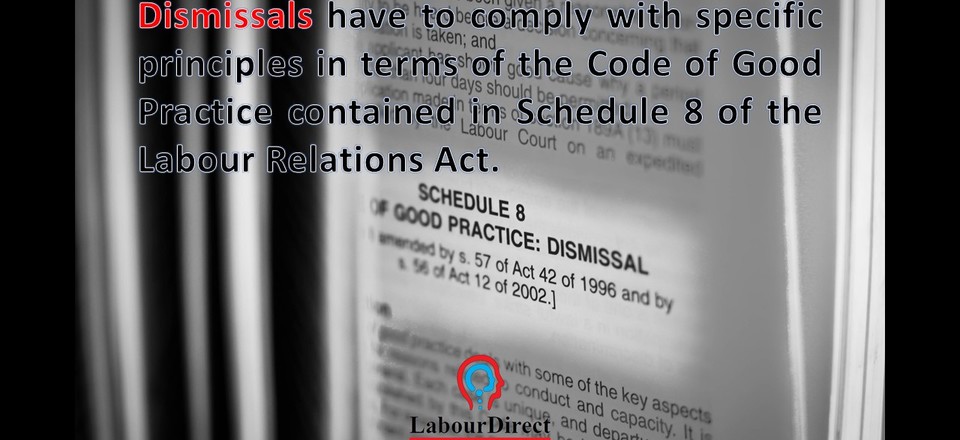"Dismissal" is defined in section 186(1) of the Labour Relations Act (LRA), and sets out the only forms of dismissal recognised in South African law.
In terms of section 186(1) of the LRA 'Dismissal' means that:
(a) an employer has terminated employment with or without notice;
(b) an employee employed in terms of a fixed term contract of
employment reasonably expected the employer-
(i) to renew a fixed term contract of employment on the same or similar
terms but the employer offered to renew it on less favourable terms, or
did not renew it; or
(ii) to retain the employee in employment on an indefinite basis but otherwise
on the same or similar terms as the fixed term contract, but the employer
offered to retain the employee on less favourable terms, or did not offer to
retain the employee;
(c) an employer refused to allow an employee to resume work after she-
(i) took maternity leave in terms of any law, collective agreement or her contract of employment;
(d) an employer who dismissed a number of employees for the same or similar reasons has offered to re-employ one or more of them but has refused to re-employ another; or
(e) an employee terminated a contract of employment with or without notice because the employer made continued employment intolerable for the employee.
(f) an employee terminated a contract of employment with or without notice because the new employer, after a transfer in terms of section 197 or section 197A, provided the employee with conditions or circumstances at work that are substantially less favourable to the employee than those provided by the old employer.
A dismissal is unfair if a fair procedure was not followed, even if the reason for the dismissal is fair and can be justified due to the seriousness of the offence. Section 188 of the LRA provides that dismissals relating to conduct, capacity and operational requirements must be conducted in accordance with a fair procedure. The Code of Good Practice contained in Scheduled 8 of the LRA provides guidelines for the fair procedure to be followed when an employer contemplates dismissing an employee for reasons related to conduct capacity or operational requirements.
Dismissals relating to misconduct would normally have to be preceded by a fair hearing, while dismissals relating to incapacity would have to be preceded by attempts to counsel the employee, to explore alternatives to dismissal and lastly an incapacity inquiry. Section 189 of the LRA also provides extensive guidelines on the procedures to be followed for dismissals based on operational requirements. An employer must be able to prove that a dismissal was effected due to one of the three grounds mentioned previously and that a fair procedure was followed as stipulated in the LRA and the Code of Good Practice.
The dismissal is unfair if the employer fails to do so.
Labour Direct is an industrial relations and human resources specialist company with a national footprint, committed to bring first class labour solutions through HR and IR services. Labour Direct strives to ensure effective compliance with legislation and endeavours to build long-term relationships...
View Profile
What is Xplorio?
Xplorio is your local connection allowing you to find anything and everything about a town.
Read More












